March 2003 (Part 1)
SELECTION OF QUESTIONS AND ANSWERS
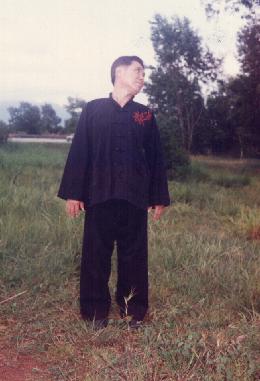
Sifu Wong demonstrating “Turning Head”, which is one of the Eighteen Lohan Hands exercises. The first eight Lohan Hands are the same as the eight exercises in a famous set of chi kung exercises called Eight Pieces of Brocade.
Question 1
I read that Self-manifested Chi Flow can cause pre-birth chi to be depleted. I wonder if you know of this phenomenon?
— Alex, USA
Answer
Technically speaking the statement that self-manifested chi flow can cause pre-natal chi to be depleted, is correct, but it is very mis-leading. The fact is that any activity can cause pre-natal chi to be depleted, not in the sense of becoming empty but in the sense of becoming less. Self-manifested chi flow would cause less depletion than most common activities like walking and talking.
Pre-natal chi is the chi one gets at conception from his parents. It is stored in the kidneys and acts as the “capital” for his life existence. When it is used up his life ceases.
Besides pre-natal chi, post-natal chi is essential for his living. It is the “fuel” for his life activities, over which he has much control. Practicing chi kung is an excellent way to increase and regulate his post-natal chi. Self-manifested chi flow is one of the best chi kung exercises.
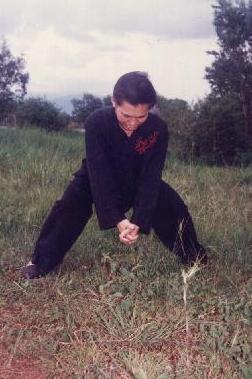
Sifu Wong demonstrating another Lohan Hands exercise called “Merry-Go-Round” which is the same as “Merry-Go-Round” in the Eight Pierces of Brocade
Question 2
“Wu wei” is supposed to be the ideal state of the Universe. If you act in wu wei then all things work out the best way. If that is so, then why don't we only do spontaneous movement chi-kung? As I understood it, spontaneous movement chi-kung (like when we flow after doing some “Lifting the Sky”) embodies wu wei.
Then shouldn't we be able to cleanse and build chi with it? When the time is right cleansing would harmoniously and spontaneously change to building, doesn't it? Isn't it 'forcing' the development (not wu wei) by doing exercises that try to dictate this developmental process?
Answer
“Wu wei” literally means “non-action”, and is often translated as such in books on Chinese, especially Taoist, philosophy. This literal translation, as is often the case in translating Chinese into Western languages, is misleading. A better translation of “wu wei” is spontaneity.
Two points are worthy of note in your question. One, the ideal state is a philosophical concept, and is relative. What is ideal to you may not be ideal to another person, or to you in a different situation. Two, there are different ways to approach the ideal.
Hence, when you are in an ideal situation, if you act in wu wei all things will work out the best way for you. When you have energy blockage, for example, you are not in an ideal situation. In this non-ideal situation, if you act in wu wei things will not work out the best way for you. You will continue to have energy blockage.
So you perform some chi kung exercise to have self-manifested chi movement. You choose this type of exercise, instead of others, because it is ideal for overcoming energy blockage. In other words, you are cost-efficient, which is an important aspect of smart training, in contrast to “water-buffalo training”. Once you have generated some vigorous self-manifested chi movement, i.e. once you have set the process of clearing energy blockage, you go into wu-wei.
As you have mentioned correctly, when the time is right cleansing would harmoniously and spontaneously change to building. You do not need to effect the change yourself, you let wu wei do it. If in the process of building there is some blockage in the way, wu wei would harmoniously and spontaneously change building to cleansing again, and so on.
Let us look at another situation. You have practiced Self-Manifested Chi Movement for a few months, have cleared away your blockage, and are now fit and healthy. Your objective now is to increase internal force to do better in your studies and enjoy your hobbies. So, to be cost-efficient you choose “Pushing Mountains” instead of Self-Manifested Chi Movement, as the former enables you to achieve your objective more efficiently.
As you perform “Pushing Mountains” as well as in the chi flow after that, you go into wu wei. If you still have some blockage which you may not know, the chi flow will clear it for you. If you have some viruses attacking certain parts of your body but it has not manifested as a clinical disease yet, your chi flow will clear away the viruses without your conscious knowing.
Then, having performed all the tasks necessary for maintaining and promoting life, the excess energy you have developed in your “Pushing Mountains” will be stored at your dan tian, ready for use when you study or engage in your hobbies. Hence, wu wei has worked the best for you.
If instead of going into wu wei, you direct your chi to your hands because you want to have powerful hands to break bricks, or direct it to your shoulder to massage it because you feel some tension there, then — if your judgement is correct and you have directed chi correctly — you will have powerful hands or relaxed shoulders. This is “yu wei”, which means “with-action”.
However, if your judgement is not ideal — for example, you may have some viruses attacking you but you do not know it — you may still break bricks with your powerful hands but you may also suffer an infectious disease. Or, if you direct your chi wrongly, not only you cannot massage your shoulders, you may cause extra blockage. But if you go into wu wei, even if you may not be aware of the viral attack or the tensed shoulders, your chi flow will overcome these problems for you, if there are no other more urgent problems at hand.
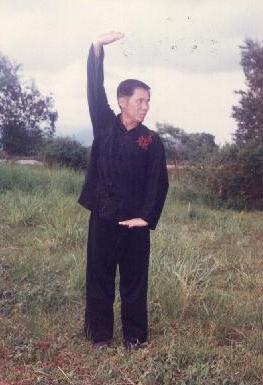
This is another Lohan Hands exercise called “Plucking Stars”, and is the same as “Plucking Stars” in the Eight Pierces of Brocade
Question 3
Have you heard of a chi kung exercise called “Five Gate Breathing”? The description is as follows -- lay down, enter meditation (chi kung state of mind) and visualize yourself absorbing chi through the top of your head, your palms and the soles of your feet (hence, five gates).
— Peter, Canada
Answer
Yes, “Five Gate Breathing” is an advanced Taoist chi kung exercise, and may be practiced while standing upright or sitting in a lotus position besides lying down.
It is simple, just like what you have described, but it is not easy as most people may not be able to enter into a chi kung state of mind.
It is not recommendable for beginners, especially those with illness. As it is an advanced exercise, it is powerful and may cause serious side effects if practiced wrongly. Paradoxically because it is simple, it is difficult to practice correctly if they learn on their own.
A very common mistake which beginning students may not realize themselves is that they are not relaxed or focused although they think they are. Thirdly, even if they practice “correctly”, if the tremendous accumulated force is not flowing properly, it can cause serious side effects.
The above paragraph is very important for those who read about chi kung from books and practice on their own. Frequently they choose exercises which are powerful and simple, without knowing that it is not easy. They may cause serious, and often insidious, harm to themselves without realizing it.
But if you are already familar with chi kung or are practicing under the supervision of a competent instructor, “Five Gate Breathing” is a good exercise.
Question 4
Can some chi kung be used directly for fighting? For instance, “Thrusting Fist” is a thrust punch, and “Green Dragon Presents Claws” looks like a dragon-claw strike.
Answer
In a broad sense, all chi kung can be used directly for fighting. The fundamental tasks of chi kung, — any chi kung, including those types of a low level — are to increase energy level and improve energy flow. (Low level chi kung will take a much longer time to accomplish these tasks than high level chi kung.) If you have more energy and it flows more smoothly, naturally you can fight better.
Indeed, much of kungfu training involves these two tasks of energy accumulation and energy circulation. But today, due to misconception and ignorance, many people think of kungfu training as learning techniques, and worse still learning external kungfu forms without even these forms are used as techniques for fighting.
But in a narrow sense, a lot of chi kung has no direct fighting dimension. One widely accepted way of classification is to classify chi kung into the following categories: medical, health, intellectual, martial and spiritual. Hence, only one out of five categories deal directly with fighting.
In a even narrower sense, not all martial art chi kung is used directly for fighting! For example, Small Universe is greatly valued by martial artists as it gives them a lot of power and stamina. But martial artists do not directly use Small Universe to fight, in the way they use Iron Palm or Tiger Claw.
Yes, “Thrusting Fist” is a thrust punch, and “Green Dragon Presents Claws” can be a dragon-claw strike. But they are not chi kung exercises. “Thrusting Fist” is a technique, and “Green Dragon Presents Claws” is a pattern. One can use different patterns to implement the technique of “thrusting fist”, such as “Black Tiger Steals Heart” and “Big Boss Offers Wine”. One can also use the same pattern “Green Dragon Presents Claws” to implement different techniques besides that of a dragon-claw strike, such as a “threading” defence or a “piercing” attack.
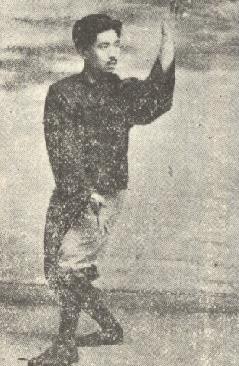
Baguazhang or Pakua Kungfu is a famous style of internal kungfu. Here is a basic Pakua pattern demonstrated by Sifu Sun Sek Fang taken from "Genuine Transmission of Pakua Kungfu" written by him
Question 5
What is the Buddha's view on suicide?
Answer
The Buddha and all Buddhists love life, their own and that of others. Taking away life, even his own, is sinful and brings bad karma. A person who commits suicide is generally reborn in one of the three evil realms of existence, i.e. the realms of hell, of ghosts and of animals. Hence, suicide leads him from a bad life to a worse one.
No matter how bad life has become, one should never consider suicide. If a person is really dirven to such a seemingly hopeless situation, he could renounce everything and become a monk. This is not a good way to become a monk — one should enter monkhood only after much deep consideration and at the prime of his accomplisment, but it is a good alternative to suicide. He can then leave his past and focus on cultivating to elevate his previous bad karma.
Question 6
I would like to comment on your “Complete Book of Zen.” When I bought it, I only wanted to learn a bit of superficial knowledge about Zen. By the time I had finished, I had a sound understanding of Zen Buddhism (not superficial at all) and had been motivated to practice Zen. Your book was simple, direct and effective. Currently I am still cultivating moral purity, before I begin meditation. Thank you for changing my life.
Answer
I am glad that my book has been helpful to you. Congratulations for your decision to cultivate moral purity and then meditation. These two types of cultication are the twin pillar of Zen and of all schools of Buddhism. Cultivating moral purity leads to blessings, and cultivating meditation leads to wisdom.
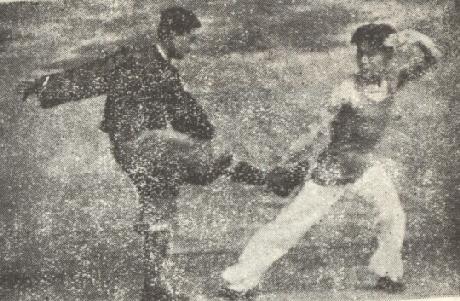
Comnat Application of Pakua Kungfu. Slanting the body backward to avoid a kick or other attack, demonstrated by the Pakua exponent on the right, is a popular defence technique in many styles of kungfu, and this same pattern is known by various names. Here in Pakua Kungfu it is called “Pursue Wind Chase Moon”. In Shaolin Kungfu it is called “Tame a Tiger with a String of Beads”. In Taijiquan it is “Low Stance Single Whip”.
Question 7
Is Pa Tuan Tsin (The Eight Precious Sets of Exercises) the same as Ba Duan Jin or Ba Kua Chang?
— Peter, U.S.A
Answer
Pa Tuan Tsin is the same as Ba Duan Jin but different from Ba Kua Chang.
Transcribing Chinese characters into English spelling, or any spelling using the alphabet, poses a few problems.
First there is the problem concerning which of the many Chinese dialects to use. There are more than a hundred dialects in which the Chinses language is spoken! The two most important dialects are Mandarin and Cantonese.
Mandarin, which means the language of court officials, is spoken widely in north China and Taiwan. Interestingly, in China today, Mandarin is called “putonghua”, which means the language of the common people. In Taiwan it is called “guo yi”, which means national language. Most of Taijiquan terms today are translated into English following the Mandarin pronunciation.
Cantonese sounds closer to Chinese spoken in classical and ancient times. Chinese poetry sounds beautifully when read in Cantonese, but out of rhyme when read in Mandarin. Cantonese is spoken in south China, Hong Kong and most overseas Chinese communities, like in the United States, Canada, Britain and Australia. Most Shaolin terms today are translated into English following the Cantonese pronunciation.
After deciding on the sound system to be transcribed, the next problem is to choose the spelling system to transcribe it. The spelling system used in English is meant to transcribe English sounds, which it often does badly. For example, “bus” is not pronounced as /bus/, like the Irish say it, but as /bas/, and “mother” is not pronounced as /mother/ but as /mather/. The English, therefore, should not complain that other people mis-pronounce!
Using English spelling to transcribe Chinese sounds is worse. There are simply not enough letters in the alphabet for all the Chinese sounds. To make matter even worse, each Chinese sound can be pronounced in four different tones, which are alien to English speakers.
“Pa Tuan Tsin” and “Ba Duan Jin” are different spelling systems to transcribe the same sounds. “Ba Duan Jin” is more exact. It uses not the English spelling system, but the Romanized Chinese system. Everyone who knows the Romanized Chinese system will pronounce “Ba Duan Jin” in only one way. “Pa Tuan Tsin” is inexact. For example, different people may pronounce “Tsin” differently. Some may pronounce it like /tin/, some like /sin/, some like /jin/ and others like /chin/.
Please take note that “Ba Duan Jin” is transcribed in the Romanized Chinese system, and not in the English spelling system. The Romanized Chinese “Ba Duan Jin” sounds something like /P'a T'uan Ch'ing/ in the English spelling system, and not like /Ba Duan Gin/. Similarly, the Romanized Chinese “qigong” sounds like /ch'i kung/ in the English spelling system, and not like /ki gong/.
“Ba Kua Chang” is “Ba Gua Zhang” in Romanized Chinese, and “Pa Kua Chang” in the English spelling system. “Ba Gua Zhang” is usually written in one word as “Baguazhang”.
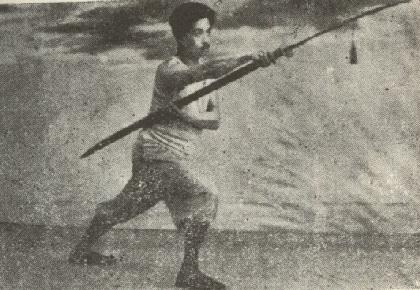
Some people have the mis-conception that there are no weapons in Pakua Kungfu or Baguazhang. Here the Pakua master, Sifu Sun, demonstrates a reversed sweep of the Dadao, or Big Knife.
Question 8
If so, is this a form or style of Qi Kung? If not, how do they differ and how effective are they in the cure or betterment of diabetes, hypertension, and colitis or other colon disorders?
Answer
“Ba Duan Jin” is a very effective form or style of chi kung (or qigong, but seldom written as “qi kung”). “Baguazhang” is a very effective form or style of kungfu (or gongfu). Basically, Ba Duan Jin is a set of energy exercise for good health, whereas Baguazhang is a system of martial art for combat.
Ba Duan Jin is very effective for overcoming any illness, including diabetes, hypertension, coilitus and other colon disorders. Baguazhang is not normally used to overcome illness, although a Baguazhang master may generate energy flow which may be similarly used as Ba Duan Jin is used.
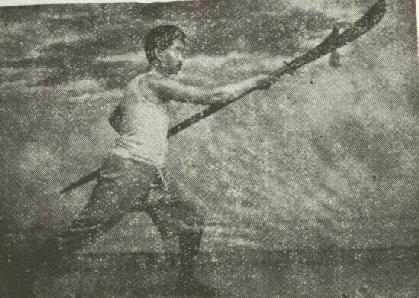
This is a diagonal chop of the Dadao, or Big Knife. The Big Knife techniques in Pakua Kungfu are similar to those in Shaolin Kungfu.
Question 9
How can I tell when chi is being properly circulated through the meridians? Is it essential to consciously guide, or even be aware of, chi flow in order to gain beneficial results, or does it occur automatically?
Answer
You can tell by being healthy. If your chi, or energy, is not properly circulated through the meridians, you will be sick. Indeed, although there are thousands of methods in Chinese medicine, they have only one primary function, that is restoring proper chi flow through the meridians.
If you are well trained in chi kung, you can sometimes feel the energy flow. It can be like flow of warm water or of electricity.
It is not ncesaary, and for untrained persons not advisable, to consciously guide chi flow to gain benefits. Untrained persons are unaware of it, just as they are unaware of their blood flow. Even if you are trained in chi kung, once you have generated a vigorous flow, it is often better to let your chi flow spontaneously, unless you wish to guide or direct it for some particular purposes. This is the principle of “wu wei”, or “spontaneity”, and is very important in chi kung.
Chi flow occurs automatically and naturally, just like all your life-maintaining functions. In fact it is the chi flow that provides the energy to work all your life-maintaining functions. And just like all your life-maintaining functions, if this automatic, natural flow is interrupted, in which case you will be sick, something unnatural has happened.
In Western medical philosophy, the therapeutic approach is to find out what factors cause which life-maintaining functions to mis-function, then remove the causative factors and restore the functions. In Chinese medical philosophy, the therapeutic approach is to find out which life-maintaining functions mis-function, then restore the functions, without worrying about the causative factors!
In chi kung philosophy, the therapeutic approach is the most fundamental. Restore the natural chi circulation which will automatically and naturally restore the life-maintaining functions, without even worrying what the causative factors or where the mis-functioning are! Does it work? Yes, successfully for centuries.
